- Home
- M G Vassanji
The Book of Secrets
The Book of Secrets Read online
INTERNATIONAL ACCLAIM FOR
THE BOOK OF SECRETS
“Vassanji masterfully weaves an extraordinarily colorful and richly complicated carpet.… A big book in every sense.”
— Toronto Star
“A testament to the almost mystical power of written words, Pius Fernandes’s search for the truth is also a celebration of storytelling.”
— New York Times Book Review
“As I read this book about exiled people squeezed by war and circumstance, I thought of other novels that seem its cousins: Timothy Findley’s Famous Last Words, Michael Ondaatje’s The English Patient, Graham Greene’s The Heart of the Matter.”
— Lawrence Scanlan, Globe and Mail
“A poignant, questioning work that confirms Vassanji as one of our most thoughtful, as well as one of our more able, writers.”
— Financial Post
“A work of art.… Highly recommended.”
— Library Journal
“A mesmerizing and rewarding literary experience.”
— Winnipeg Free Press
“From its opening page it is clear that The Book of Secrets is a story about the importance of language and writing in shaping history.… Vassanji’s prose is simple and evocative, with a light touch he recreates places and times, deploying flashes of colour with a careful attention to detail.”
— Financial Times (U.K.)
“The book is lush with evocations of East African physical, cultural, and historical landscapes.…”
— Publishers Weekly
“A glorious novel.…”
— Law Times
“Fact and fiction are melded into a compelling narrative which transcends reality and nourishes both mind and spirit.… [Vassanji] captures both the minute ripples of individual human motivations and the broad sweep of that grim machine we call history.”
— Ottawa Citizen
Copyright © 1994 by M.G. Vassanji
First published in trade paperback with flaps 1994
Trade paperback edition first published 1997
All rights reserved. The use of any part of this publication reproduced, transmitted in any form or by any means, electronic, mechanical, photocopying, recording, or otherwise, or stored in a retrieval system, without the prior written consent of the publisher — or, in case of photocopying or other reprographic copying, a licence from the Canadian Copyright Licensing Agency — is an infringement of the copyright law.
Library and Archives Canada Cataloguing in Publication
Vassanji, M.G.
The book of secrets / M.G. Vassanji.
eISBN: 978-1-55199-710-0
I. Title.
PS8593.A87B66 2003 C813′.54 C2003-903225-6
PR9199.3.V388B66 2003
We acknowledge the financial support of the Government of Canada through the Book Publishing Industry Development Program and that of the Government of Ontario through the Ontario Media Development Corporation’s Ontario Book Initiative. We further acknowledge the support of the Canada Council for the Arts and the Ontario Arts Council for our publishing program.
All characters in this book are fictitious, and any resemblance to actual persons living or dead is purely coincidental.
Four lines from “The Ruba’iyat of Omar Khayyam” translated by Peter Avery and John Heath-Stubbs (Allen Lane, 1979). Copyright © Peter Avery and John Heath-Stubbs, 1979. Reprinted by permission.
Seven lines from W. H. Auden on this page are from “You,” from Collected Poems of W. H. Auden by W. H. Auden. Copyright © 1959, 1962, 1963, 1964, 1965 by W. H. Auden. Reprinted by permission of Random House, Inc.
SERIES EDITOR: ELLEN SELIGMAN
EMBLEM EDITIONS
McClelland & Stewart Ltd.
75 Sherbourne Street,
Toronto, Ontario
M5A 2P9
www.mcclelland.com/emblem
v3.1
for Kabir
who wouldn’t wait
Contents
Cover
Map
Title Page
Copyright
Dedication
Epigraph
Prologue
Part One
I: The Administrator
Chapter 1
Chapter 2
Chapter 3
Chapter 4
Chapter 5
Chapter 6
Chapter 7
Chapter 8
Miscellany (i)
II: The Great Riddle
Chapter 9
Chapter 10
Chapter 11
Chapter 12
Chapter 13
Chapter 14
Miscellany (ii)
Part Two
I: The Father and the Son
Chapter 15
Chapter 16
Chapter 17
Miscellany (iii)
II: Ali and Rita
Chapter 18
Chapter 19
Chapter 20
Chapter 21
Chapter 22
Miscellany (iv)
III: Gregory
Chapter 23
Chapter 24
Chapter 25
Miscellany (v)
Epilogue
Selected Glossary
Acknowledgements
About the Author
I passed by a potter the day before last,
He was ceaselessly plying his skill with the clay,
And, what the blind do not see, I could—
My father’s clay in every potter’s hand.
— The Ruba’iyat of Omar Khayyam
Prologue
7 July, 1988
They called it the book of our secrets, kitabu cha siri zetu. Of its writer they said: He steals our souls and locks them away; it is a magic bottle, this book, full of captured spirits; see how he keeps his eyes skinned, this mzungu, observing everything we do; look how meticulously this magician with the hat writes in it, attending to it more regularly than he does to nature, with more passion than he expends on a woman. He takes it with him into forest and on mountain, in war and in peace, hunting a lion or sitting in judgement, and when he sleeps he places one eye upon it, shuts the other. Yes, we should steal this book, if we could, take back our souls, our secrets from him. But the punishment for stealing such a book is harsh — ai! — we have seen it.
They were only partly right, after all, those wazees — the ancients — who voiced wonder-filled suspicion and mistrust at the book and its writer, the all-powerful European whiteman administrator who had appeared in their midst to govern. They could not know that this mzungu first and foremost captured himself in his bottle-book; and long after it left his side — taking part of him with it — it continued to capture other souls and their secrets, and to dictate its will upon them. Even now it makes protagonists of those who would decide its fate.
Because it has no end, this book, it ingests us and carries us with it, and so it grows.
But it began simply, the story of this book, an unusual discovery put into the hands of an out-of-work schoolteacher, who at last found his calling and began to work with an industry and enthusiasm he had not mustered since his apprentice days.
I am that former schoolteacher. In my time I taught a generation or more of schoolboys. I have watched this place grow from a small colonial town into the bustling city that it is now. Many of my students have left, gone abroad to different corners of the world. Professors, businessmen, and engineers now, who left during the trying times that gripped us in the last decade, or even earlier. They’ve gone beyond me, so many of them, but I carry no regrets. They are proof of my success. Wistfully sometimes I wish I had been born later than my time, so as to be able to make the leap from this peripher
y into that centre, where all the important and exciting things seem to happen. But as I am, I have never desired to leave.
When I complain — and who doesn’t? we’ve lived through trying times as I said — Feroz laughs at me. When I mention how I miss my old Morris to transport me around, he says with his shopkeeper’s logic, “Sir, if you had left, with your talent and experience you would own ten cars!”
They still call me Sir, or Mr. Fernandes.
Three years ago, officialdom caught up with me and discovered that I had passed retirement age. I was given no option. Spending idle days since then was not easy, in this city where I had no family or close friends and was after all an immigrant. A few months ago in the beginning of March, I had found myself treading along the footpaths of Dar es Salaam’s back alleys when by accident I met Feroz. It was not the first time that a former student had come to my aid. He is not what I would count as one of my successes, and he knows it (I mention too frequently and indiscreetly my prize achievements). His once muscular body now distends, and the loose mouth gives him a friendly look that I suspect hides bad teeth and a nervousness about what he says. Financially he has not done so badly. Mixed with that Eastern respect for the guru, there is in him, I know, also some of the shopkeeper’s contempt for the low-paid teacher and self-styled thinker who ultimately does not seem to amount to much. But he came to my aid. I must confess, so straitened was my circumstance that I had been reduced to searching for a pair of shoes at the open-air mnada in Congo Street. It was as I emerged from the madness of the mnada, pushing my way through the solid throng of shoppers, raucous vendors, and jostling thieves, clutching my parcel and hastening away surreptitiously into Uhuru Street, that I bumped into him. He had, it appeared, stopped his car to give me a lift, and then got out and watched my sorry little sojourn into discount shopping.
When he heard my story, Feroz’s sense of propriety was offended. He was outraged. The very next day he took me on a round to see some people of means and influence in the city. He even telephoned a few people upcountry, he lent me money. And, failing finally to find me the kind of job he. believed I deserved, he offered me a flat to live in, here at the corner of Uhuru and Viongozi streets.
What is it like to step back into a tomb? The name on this building where I’ve been put up is Amin Mansion 1951. Downstairs, outside the corner shop, the partly obliterated sign “Pipa Store,” at the intersection nicknamed Pipa Corner, brings to mind the one possible image when I think of the name Pipa: a plump wheezing man in singlet and loincloth inside a produce shop, perched atop a tire-seat in the middle of all his wares, his fingers constantly at work folding and refolding squares of paper into packets of spices, dropping them in one fluid motion into a basket at his side, measuring time as it were with grains of turmeric, coriander, chillies.… A man with a reputation for stinginess, dirtiness of his store and person, the shadiness of some of his dealings. The store now belongs to Feroz, who uses it as a secondary business place, selling shoes, radios, and watches, his primary sphere of action being the bustle of Msimbazi, just beyond Congo Street where he found me.
It is good to have as guardian a former student, if one allows to slip by the occasional glimmers of contempt that show themselves in the gracelessness of a joke, the rudeness of unexpected familiarity, and gives due recognition to the genuine kindness and respect that are also there. The ambiguity of this breed of shopkeeper was brought home to me in the most startling fashion by Feroz one day, over tea in the shop.
“What is history, sir?” he asked.
Carefully, I pressed cup to saucer to stabilize them, and looked up and stared at him. The expression on the face of this former D-student: a smile composed equally of embarrassment and pure mischief.
“You taught history, sir. Can you write it?”
“You mean …” I began, groping in vain for some loose change in thought with which I could extricate myself as he pinned me with that look, apologetic, embarrassed, cunning.
“Let me show you something, sir. Come, sir.”
I followed him, into that famous backroom of Pipa’s day, thought then to harbour in its darkness all kinds of mysteries and evidence of shady dealings which the police could never lay their hands on. Now it was a bright fluorescent-lighted room, shelves of shoeboxes covering the walls, the sharp smell of vinyl and rubber and fresh packing filling the air. There was a table in the middle, covered with a freshly wiped, gleaming plastic sheet of a white-and-red checkered design. On it was an object, distinctly foreign to the scene, and the purpose, I sensed by the expectant stillness of my companion beside me, of our entry into this former hideaway. It was an old brown leather case, the kind used to protect passports in former days.
“Take a look at it, sir.” He took a step forward, leaned over and flipped it open, and stepped aside for me. I went to look at the book that was now exposed.
A faint odour exuded from it with the turning of the pages. It had seen some very dirty places — and what place more fittingly dirty than Pipa’s dark backroom.
“I found it in the store, sir,” said Feroz behind me.
What value could the old miser Pipa have attached to this book, I wondered. Did it come with the junk he gathered patiently over the years and sold in his crowded shop? Had this single item simply, by accident, been left over, missed the fate of the numerous pieces of paper that wrapped spices or started wood fires? Or had it been deliberately saved?
I turned to look at Feroz.
“Is it important, sir?” he said anxiously, goading the historian in me.
“It could be,” I answered.
In the last decade and a half, many relics saw the rubbish piles of this city, as people in a frantic rush to seek a new life abroad thought little of throwing reminders of the old one away. Passports, driver’s licences, books of every kind, magazines, letters, handwritten manuscripts — all rotted among unpicked garbage or met the flames or were auctioned off as scrap. Later there were fervent but mostly futile attempts to salvage these pieces of jettisoned lives.
“Tell me, where — how — did you find it?” I said to Feroz.
But at this point a servant came to call him. A consignment of shoes had arrived in the store, the Zanzibari blackmarketeer was waiting to be paid. Feroz turned to go, saying to me, “Later.” I hurried out with him, taking the book. Seeing it clutched under my arm, he stopped. “I have to look at it carefully,” I explained. I promised to guard it with my life. There was no time to argue. The anxiety on Feroz’s face as he extracted the solemn oath from me was a thing to ponder.
It was a diary. A 1913 edition, published by Letts, and of the “Explorer” variety, which could be used for the following year, presumably by those confined to those regions of the globe with limited access to amenities. Five by eight inches, it allowed for three days a page. The cover was soft board, beige with black type, except for “Explorer” flourished diagonally in large red italics. The endpapers were covered with advertisements of the day — Indo-European Telegraph Company Ltd.; Royal Insurance Company; Eno’s Fruit Salt — “A Pleasant Way to Health Before Breakfast, The Natural Way.” There followed two pages with the sunrise and sunset times for 1913 in Capetown, Bloemfontein, Bulawayo, Pretoria; postal rates to South Africa; cable rates; and 1913 customs tariffs to South Africa.
After this information came a clear page, inscribed with the owner’s name and address in the centre:
Alfred Corbin
Kikono, British East Africa
and the first part of a Latin inscription: “at nos hinc …” the rest was stained and illegible.
Inside were brittle, yellowed pages, encrusted with open, dry capsules of cockroach eggs; insect remains, thin like fossils, releasing the pungent dust of their own decay. Several pages were torn off, many were stained; there were sections which had been neatly burrowed through by silverfish.
The ink was faded, the writing often unreadable. Much of it consisted of typical diary entries against dates — scra
wled, cryptic, the obligatory reminders or notes (for example, the entry for 27 February, 1913: “Crossed the equator. Parades, dinner, ball; weather wonderful so far …”). And then, intermittently, there were neater long journal entries written in sloping hand. I gathered that Corbin must have been quite a letter-writer, and probably shared his observations with correspondents.
Sir Alfred Corbin was, of course, Governor of Uganda in the late 1940s, after which he retired from the Colonial Service, though he was called upon later to advise the British government on the independence of that and other African colonies. He had served a long time in the British administration in the area, and even worked on the policy that went under the name of Indirect Rule. The diary in my hands was a record of an early posting, one forgotten fragment of an addendum to a well-documented history. And as such, of what interest to me, these personal outpourings, the scribblings of a young colonial officer, drafts of letters to mother or father, or perhaps notes for his eventual memoir?
This is how I have come to picture him: seventy-five years ago, in 1913, the only white man in an African village, sits at a rough, crooked wooden table in his rough wooden house. Above him, from a beam, hangs a pressure lamp. Outside, pitch darkness interspersed by the light of a few lamps and candles. The man at the table puts down the glass he’s sipped from, picks up his fountain pen, and writes in his diary. By this writing he begins to weave the thread that will connect to me.
Even before I began to pore over Corbin’s entries which would subsequently so grip me, I could not help but feel that in some mysterious manner the book touched our lives; was our book. There was, I felt, much more there than the contents of its pages; there was the story of the book itself. Written here amongst us, later perhaps hidden, and now found among us, it must have left a long and secretive trail, a trail that if followed would reveal much about the lives and times it witnessed, and tell us why the diary finally surfaced where it did.

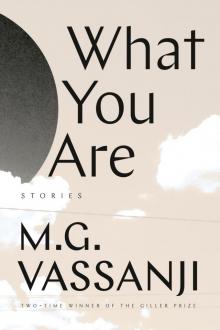 What You Are
What You Are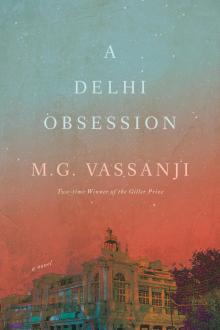 A Delhi Obsession
A Delhi Obsession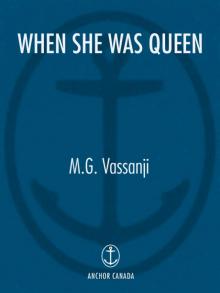 When She Was Queen
When She Was Queen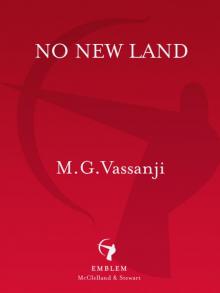 No New Land
No New Land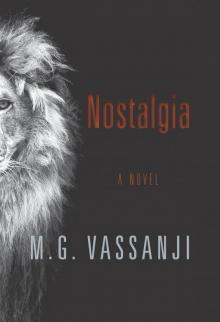 Nostalgia
Nostalgia Mordecai Richler
Mordecai Richler The Book of Secrets
The Book of Secrets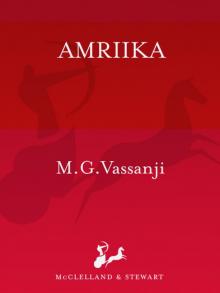 Amriika
Amriika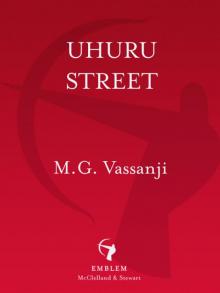 Uhuru Street
Uhuru Street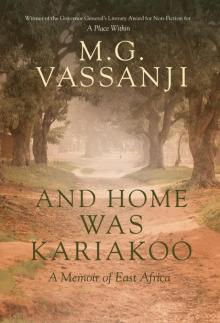 And Home Was Kariakoo
And Home Was Kariakoo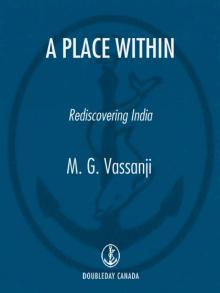 A Place Within
A Place Within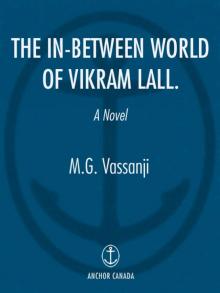 The In-Between World of Vikram Lall
The In-Between World of Vikram Lall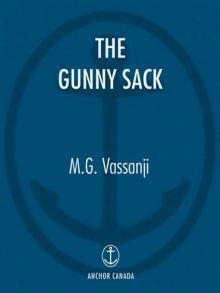 The Gunny Sack
The Gunny Sack